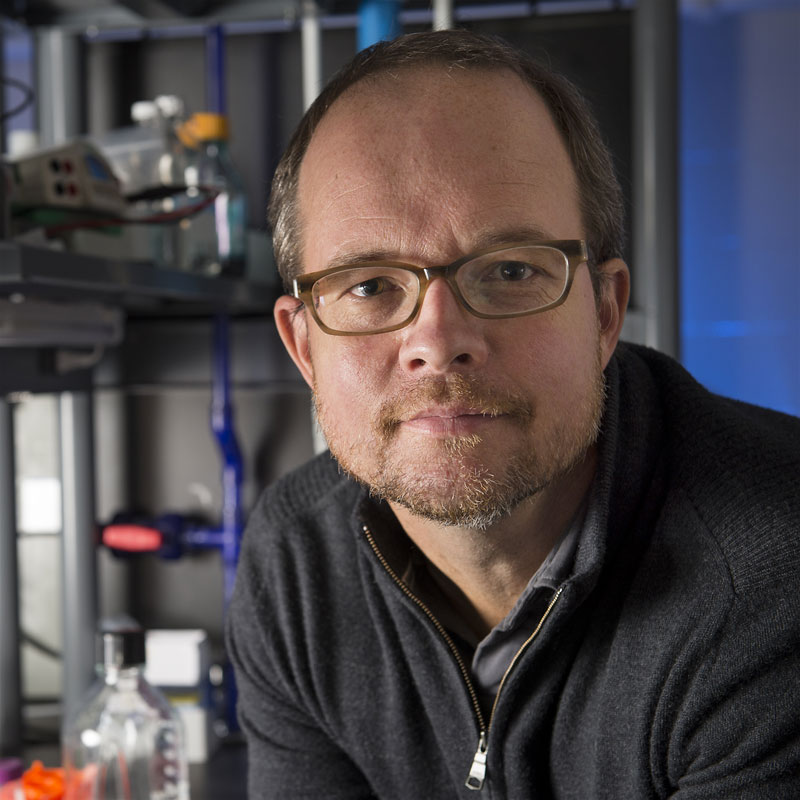
Newell R. Washburn
Associate Professor, Chemistry and Biomedical Engineering
- Mellon Institute 814
- 412-268-2130
Education
Ph.D. in Chemistry, University of California (Berkeley), 1998Research
Keywords: Materials chemistry, biomaterials, sustainability, machine learning
Research in the Washburn Group focuses on the intersection of materials chemistry and sustainability. We develop a fundamental understanding of some of the most widely used materials in the world and leverage this to reducing their environmental impact. Our current studies center on biobased polyurethane elastomers and limestone/calcined clay cements (LC3). Machine learning is a central tool that we use in the design process. We have developed the hierarchical machine learning algorithm as a methodology for building accurate models from small, experimental datasets. Students in the Washburn Group gain expertise in both laboratory research and data science, making them uniquely prepared to address critical challenges in materials sustainability.
Publications
Predicting Young’s Modulus of Linear Polyurethane and Polyurethane–Polyurea Elastomers: Bridging Length Scales with Physicochemical Modeling and Machine Learning
Pugar JA, Gang C, Huang C, Haider KW, Washburn NR. ACS Applied Materials & Interfaces. 2022 Mar 30;14(14):16568-81
Advancing cement‐based materials design through data science approaches
Rios RT, Childs CM, Smith SH, Washburn NR, Kurtis KE. RILEM Technical Letters (2021) 6:140‐149
Elucidating the Physicochemical Basis of the Glass Transition Temperature in Linear Polyurethane Elastomers with Machine Learning
JA Pugar, CM Childs, C Huang, KW Haider, NR Washburn. The Journal of Physical Chemistry B 124 (43), 9722-9733
Cheminformatics for Accelerated Design of Chemical Admixtures
Childs CM, Canbek O, Kirby TM, Zhang C, Zheng J, Szeto C, Póczos B, Kurtis KE, Washburn NR. Cement and Concrete Research 136, 106173
Embedding Domain Knowledge for Machine Learning of Complex Material Systems Based on Small Datasets
Childs CM, Washburn NR. MRS Communications, (2019) 1-5
Molecular Engineering of Superplasticizers for Metakaolin‐Portland Cement Blends with Hierarchical Machine Learning
Menon A, Childs CM, Poczós B, Washburn NR, Kurtis KE. Advanced Theory and Simulations. 2019 Apr 1;2(4)
Elucidating Multi-Physics Interactions in Suspensions for the Design of Polymeric Dispersants: A Hierarchical Machine Learning Approach
Menon A, Gupta C, Perkins KM, DeCost BL, Budwal N, Rios RT, Zhang K, Poczos B, Washburn NR. Molecular Systems Design & Engineering. 2017; 2: 263-273
Appointments
| Years | Position |
|---|---|
| 2010–present | Associate Professor of Chemistry and Biomedical Engineering, Carnegie Mellon University |
| 2004–2010 | Assistant Professor of Chemistry and Biomedical Engineering, Carnegie Mellon University |
| 2000–2004 | Research Chemist, Polymers Division, National Institute of Standards and Technology |
| 1998–2000 | Post-Doctoral Associate, Department of Chemical Engineering and Materials Science, University of Minnesota |
| 1998 | Ph.D., Chemistry, University of California (Berkeley) |
| 1993 | B.S., Chemistry, University of Illinois at Urbana-Champaign |
Awards and Distinctions
| Years | Award |
|---|---|
| 2020 | Covestro Global Science Award |
| 2010 | Coulter Foundation Translational Research Award |
| 2005 | 3M Non-Tenured Faculty Grant |